 |
| Roger Scruton at home on his land near Malmesbury, Wiltshire, the place he calls ‘Scrutopia’. Photograph: Andy Hall for the Observer |
Interview
Roger Scruton: ‘Funnily enough, my father looked very like Jeremy Corbyn’
Philosopher Roger Scruton was derided by liberal academia in the 80s for his attacks on the radical left. As that book is reissued, the ‘squire of Scrutopia’ talks about his depressive father, hunting and, of course, Labour’s new leader
Tim Adams
Sunday 4 October 2015
I
t has been a good couple of weeks for digging up the politics of 1985. Thirty years ago Roger Scruton, then a wild-haired, tweed-coated professor of philosophy and aesthetics at Birkbeck College in London, published a volume of essays entitled Thinkers of the New Left. The book was a closely argued attack on what Scruton saw as the prevailing fundamentalism of his world, the grip of Marxist and post-Marxist thinking within Britain’s universities.
 It would be fair to say the book did not receive a warm welcome. In 1985 Margaret Thatcher was at the height of her ideological warfare against the nation’s research departments, particularly in the humanities; the dons of Oxford University had just taken the unprecedented step of refusing the prime minister an honorary degree. Scruton, the most visible example of that suddenly rare breed, a rightwing academic, found himself a lightning rod for all the fear and loathing six years of Tory government had produced; his somewhat esoteric book was greeted with derision and outrage with, as he recalls, “reviewers falling over each other for a chance to spit on the corpse”. The vitriol was such, he suggests, that it marked “the beginning of the end of my academic career” and made him a pariah (I recall seeing Scruton stand up to make a contribution to an open lecture at Cambridge not long after that, and a loud hiss going around the audience before the bogeyman had a chance to speak). His publisher, Longman, apparently under pressure of a boycott from other more profitable writers on its academic list, swiftly remaindered the book, and Scruton was left with several boxes of them in his garden shed.
It would be fair to say the book did not receive a warm welcome. In 1985 Margaret Thatcher was at the height of her ideological warfare against the nation’s research departments, particularly in the humanities; the dons of Oxford University had just taken the unprecedented step of refusing the prime minister an honorary degree. Scruton, the most visible example of that suddenly rare breed, a rightwing academic, found himself a lightning rod for all the fear and loathing six years of Tory government had produced; his somewhat esoteric book was greeted with derision and outrage with, as he recalls, “reviewers falling over each other for a chance to spit on the corpse”. The vitriol was such, he suggests, that it marked “the beginning of the end of my academic career” and made him a pariah (I recall seeing Scruton stand up to make a contribution to an open lecture at Cambridge not long after that, and a loud hiss going around the audience before the bogeyman had a chance to speak). His publisher, Longman, apparently under pressure of a boycott from other more profitable writers on its academic list, swiftly remaindered the book, and Scruton was left with several boxes of them in his garden shed.
Thirty years on, and with the nation suddenly in thrall to the political battle lines of 1985 once again, he is having another go. He has a revised and rewritten version of his original book about to come out, this time more provocatively titled: Fools, Frauds and Firebrands, a grouping that includes one or two new targets, such as the late historian Eric Hobsbawm and the current hero of the intellectual left (and international director of humanities at Birkbeck), Slavoj Žižek.
Now 71, and generally up for a scrap, Scruton approaches publication with a degree of trepidation – he originally returned the advance his current publisher, Bloomsbury, had given him for the book under instruction from his wife, Sophie, who told him: “Roger, you don’t want to go there again!” But in the end, he says, he was persuaded by the fact that despite everything, despite the collapse of communism, what he calls the radical leftwing “nonsense factory” with its impenetrable texts established by the likes of Louis Althusser and Gilles Deleuze, had not gone away. “That, I think, and the sight of Eric Hobsbawm, lifelong supporter of the Soviet Union, accepting the ultimate establishment honour, the Companion of Honour, did it…” he says, with a glum laugh (not for nothing did Scruton once write a book called The Uses of Pessimism).
He is talking in his Cotswold farmhouse near Malmesbury in Wiltshire, what he calls “Scrutopia”, to which he retreated 20 years ago without a telly to create the English rural idyll after which his writing – about architecture and music and religion and politics and sex – had always hankered. He now has 100 acres (“we own the view”) and a string of hunting horses. He had delayed our interview an hour because he and Sophie, his second wife, 30 years his junior, had planned to ride out early in the morning; in the event, the weather had closed in and they had not gone. He greets me in his high-beamed study, once a barn, and we talk inevitably first of all about the way the 1980s seem to have returned to the Labour party in the person of Jeremy Corbyn.
“My view, of course,” he says, “is that it shows the complete division between the need that Marxists have for a comprehensive philosophy, and ordinary Labour voters who don’t crave that…”
He sees in Corbyn a manifestation of that old apparatchik desire for purity of thought and action?
“Yes, it is purity almost in the Islamic sense, I think,” he says, “the craving for a pure being outside the messy and polluted order of things. It seems to me a terrible thing that the Labour party has done, in not giving the parliamentary party the right to elect its leader. Those are the people who are going to be led.”
 |
| Scruton at home: ‘It was a training in humility, stepping into the rural way of life.’ Photograph: Andy Hall/The Observer |
His 1985 book was one element of his journey to what he sees as academic pariah status. There was also his stout defence in the 1980s of the Bradford headmaster Ray Honeyford, who had argued for the need for greater integration of Muslim children in British schools in the pages of his magazine, and who lost his job as a result, as well as a stream of expressions of what might be called high-end Downton Abbey positions on feminism, gay rights, blood sports, the Church of England, pop music, the decline of manners, sex. These have often been so provocative that it seemed Scruton relished being the lone voice, the professional contrarian. Was that the case?
“No, not at all,” he says without a smile. “I thought I was just arguing. I never dreamed this book, for example, would produce the response that it produced. I was actually very depressed by it. I was close to suicide at one stage, actually, my first marriage had ended, I was very much on my own and all these reviews just went on and on about what I had done being a disgrace to the intellectual world. I had expected some people to be cross. But not that.”
His 1985 book was one element of his journey to what he sees as academic pariah status. There was also his stout defence in the 1980s of the Bradford headmaster Ray Honeyford, who had argued for the need for greater integration of Muslim children in British schools in the pages of his magazine, and who lost his job as a result, as well as a stream of expressions of what might be called high-end Downton Abbey positions on feminism, gay rights, blood sports, the Church of England, pop music, the decline of manners, sex. These have often been so provocative that it seemed Scruton relished being the lone voice, the professional contrarian. Was that the case?
“No, not at all,” he says without a smile. “I thought I was just arguing. I never dreamed this book, for example, would produce the response that it produced. I was actually very depressed by it. I was close to suicide at one stage, actually, my first marriage had ended, I was very much on my own and all these reviews just went on and on about what I had done being a disgrace to the intellectual world. I had expected some people to be cross. But not that.”
 |
| Roger Scruton |
One of the ironies of Scruton’s original Thinkers of the New Left book was that underground “samizdat” copies of it were distributed in the former Czechoslovakia long after it was withdrawn in Britain. This was also the case with the Salisbury Review, the only British journal afforded this honour. Through the 1980s Scruton had been involved with the Jan Hus Educational Foundation in Czechoslovakia, which involved western academics smuggling forbidden literature and providing classes in Prague and Brno and Bratislava as part of a covert education initiative leading to university degrees for dissidents. His efforts to bring blacklisted books into the country led to him being detained and expelled by the communist government, and listed on the Czech Index of Undesirable Persons. After the fall of communism President Václav Havel awarded him the Czech Republic’s Medal of Merit for his work.
“This book was very much motivated by my response to what I had seen behind the iron curtain, which was mostly ignored or excused by these thinkers,” he says. “I wrote originally in a state of real anger, because I was seeing the results of this philosophy. The excuses for the Gulag of people like Hobsbawm did upset me greatly…”
Does he still feel that anger now?
“Not so much, I mean after the revolutions of 1989 some of what I wrote became accepted fact. And of course the [market] solutions were not perfect. But there is still the indignation that young people in our universities are required to read all this stuff, clogging their minds with nonsense from Deleuze and [Michel] Foucault when they could be reading Shakespeare…”
Did he feel vindicated to some degree by the events of 1989, the end of Soviet communism?
He laughs. “When the Berlin Wall came down the history society at my college, Birkbeck, declared an open meeting for all members to discuss this great event. They invited as their speakers Eric Hobsbawm and Perry Anderson [the old Etonian editor of the New Left Review]. It was going to be a debate between the old left and the new left. They were aware that I actually knew people who were then being appointed president and prime minister of various countries they were talking about, that I had been directly involved, but of course there was no suggestion that I be allowed to say a word.”
 |
| Roger Scruton |
Scruton’s dislike of leftwing authoritarian regimes seems in some respects wrapped up in his relationship with his father, Jack Scruton, who looms large in his wry and thoughtful memoir Gentle Regrets. He had a desperately unhappy childhood, dominated by his father’s depressive moods. Jack Scruton grew up dirt poor in Manchester where, though he was very bright, his own father, a drunk, made him leave school at 14 and work as a labourer. After the war he got himself to teacher-training college and became both a schoolmaster and passionate socialist. He was, in Scruton’s memory, a harsh man; he would not allow his children to read Beatrix Potter because, he claimed, “it polluted the image of the countryside with cosy bourgeois sentiment and turned our wild Saxon inheritance into a suburban fairytale”. He hated family life in High Wycombe, where they lived, and he hated it even more after his long-suffering wife died of breast cancer when Scruton was in his teens. He disapproved of his son taking a place at the selective grammar school, with its affectations of privilege, and when Roger won a place at Cambridge the pair became estranged. Does Scruton see all his own subsequent work, I wonder, his delight in the squirearchy, as an extended act of rebellion?
“That relationship was a huge thing in my life,” he says. “I am always returning to it and returning to him. Funnily enough he looked very like Jeremy Corbyn. And his worldview was pretty similar too.”
Don’t all sons, I suggest, define themselves against their father and then find themselves becoming more like him?
“There is a chapter in Gentle Regrets called ‘Coming Home’,” he says, “which is really me expressing my later admiration for my father’s public spirit. He was a great campaigner against change and modernism [in High Wycombe]. He inspired in me a love of detail in local architecture. And, I suppose, the idea that we are in this world not to stir things up but to settle down. It was a very unusual socialism he had. The old co-operative guild socialist ideal. And all wrapped up with a poetic vision of England and what it had meant, and how the Saxon working men had freed themselves from the Norman aristocracy. There was a vision there that I didn’t endorse exactly but that I thought was a serious moral idea.”
Was one of the impulses to become a professional aesthete a reaction against his father’s hatred of elitism?
“Perhaps. I went to a very good school, High Wycombe Royal Grammar; our masters were people who had come home from the war looking for a job at Eton and not managed it, so had gone for the next best thing. I learned an awful lot there.”
The meritocracy that grammar schools imply, the way he got on, seems at odds with his love of the established order and for people to settle and know their place?
“Yes. But you can only rise in society if society itself stays put. Otherwise there is nowhere to go. It is meritocrats who should have the strongest interest in maintaining the established order, otherwise there is nothing to climb. My father of course was extremely hostile to the grammar school and the whole idea of selection on old socialist grounds.”
And he couldn’t take pride in you?
“I think he felt pride. It was sad, he would go to the pub and tell his mates how many A-levels I’d got. But when he came home he couldn’t face what he encountered there, which was this boy with A-levels.”
If this upbringing led to some depression in Scruton himself, the antidote was an unconventional one. He took up hunting.
“By 1990,” he says, “I was lonely and conflicted, and these academic attacks had left me very nervous.”
Nervous in the sense of not knowing how he would earn a living?
“Yes, but also feeling not wanted, rejected, and all that sort of crap. I was living in a flat in Notting Hill Gate and I had been married and divorced. And then I discovered hunting and rented a little cottage, through someone I met hunting, on the outskirts of Swindon. I left Birkbeck and took up a part-time position at Boston University that paid more for a term than I got for a year in London. I was able to get this old run-down farm. I decided when I found this place I can just be myself, and settle and make a living by writing, and something good might happen. And then I met Sophie straight away.”
As Jane Austen – or Jilly Cooper – might have scripted it, the pair met on horseback; the thrill of the chase bonded them and, two children later, apparently continues to do so.
“Hunting was a big change,” Scruton says. “For the first time in my life I was doing physical things, and relating directly to animals. I’ve always loved horses. And then more importantly I was forced into a relationship with ordinary rural people who have a completely different approach to life from what one has been used to in London and Cambridge. It was a training in humility, stepping into a way of life. Labour hasn’t succeeded in abolishing it, but conduct has been modified. I’m sure if Corbyn ever got in it would be a crime to even put on a hunting jacket…”
Does he not see it just as a closed world, though, a sentimental and closeted confection of Englishness?
“What is interesting to me is the idea that rural England is still fundamental to the whole nation’s patriotic feelings. But its way of life involves these activities of which urban people disapprove. I am an urban incomer, I am still working on getting accepted. Obviously if neighbours come in and see a room full of books it is a bit disconcerting, there is clearly something wrong with me, but I apologise as much as I can…”
We talk a little about how the fabric of the society he describes has been undone as much by unfettered markets and second-home owners as by anti-hunting laws. Isn’t it just too easy, I wonder at one point, to sit out here in the 18th century, playing the organ in the local church (he has, he admits, to cross his fingers through certain bits of the Christian creed, though he wants to believe) and riding to hounds, while bemoaning the state of Britain? Does he really feel qualified to pass judgment on other lives while adopting this particular caricature? He has been vocal for example in defending the right of people to express homophobic views, and to object to gay marriage, in defiance of what he sees as political correctness. But isn’t it just a failure of empathy to see the real harm done by such views?
“That’s the justification that is given. You are defending a victim. It was the same with the anti-racism thing: we are going to persecute Ray Honeyford on behalf of people whose lives have been destroyed by racism…”
Of whom there are many…
“Of course. Lives are destroyed by many things. They are destroyed by anti-racism too, as Ray Honeyford’s was. The same is true of the homosexuality thing. When the Wolfenden report of 1957 took away the criminalisation of homosexuality everyone thought it was the removal of a great and obvious injustice. But since then the propaganda has been worked up that homosexuals are still persecuted. Indeed the less they are persecuted the more hysterical the propaganda is because you have to look very hard for the victim or the slur or whatever…”
In Scrutopia, then, the real victims are people like him, who just want to say what they think?
“I had the great disadvantage as a don at Peterhouse [College, Cambridge] of being proletarian, rightwing and heterosexual,” he says, with a laugh. “The three great faults combined in one person. It isolated me completely…”
That isolation, real or imagined, is something from which Scruton has fashioned a comfortable living. I wonder, before I leave, if he is hopeful that the academic establishment will ever again allow his kind of voice to be heard?
“I am not hopeful about much,” he says. “But I do think it is natural for human beings to try to think clearly. People do recognise bullshit.” Though, as he knows only too well: “The problem is so many careers are invested in it…”
Fools, Frauds and Firebrands: Thinkers of the New Left is published by Bloomsbury, £16.99. Click here to buy it for £13.59
Scruton on… the thinkers of the left
…Eric Hobsbawm
“Hobsbawm affirmed (in the Daily Worker, 9 November 1956) that he approved of what was happening in Hungary, though with a ‘heavy heart’. Until his death in 2012 Hobsbawm continued to extend his heavy-hearted approval to atrocities. His case illustrates just how far you can go in collaborating with crime, when the crime is committed on the left.”
…Louis Althusser
“For Althusser Marxist dogma is ‘revealed’ by being concealed. It is the act of concealment, within intellectual structures of impenetrable opacity, which guarantees the truth of every revelation. The axioms of Marxist theory appear in Althusser’s prose like blinding flashes of total darkness, within clouds of grey on grey.”
…Jean-Paul Sartre
“Sartre changed the language and the agenda of postwar French philosophy, and fired the revolutionary ambitions of students who had come to Paris from the former colonies. One of those students, Pol Pot, was later to return to his native Cambodia and put into practice the ‘totalising’ doctrine that has as its target the ‘otherness’ of the bourgeousie.”
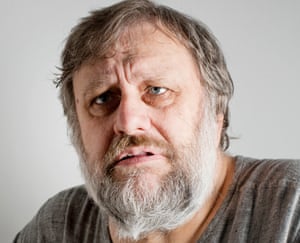
…Slavoj Žižek
“Žižek’s defence of terror and violence, his call for a new party organised on Leninist principles, his celebration of Mao’s cultural revolution, the thousands of deaths notwithstanding – all of this might have served to discredit Žižek among more moderate leftwing readers, were it not for the fact that it is never possible to be sure he is serious.”
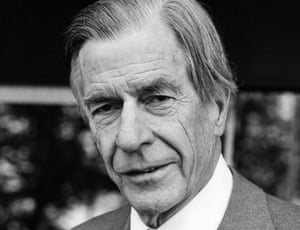
…JK Galbraith
“Galbraith’s criticism of the American system predictably earned him a secure position within it. But his appointment as ambassador to India in 1961 [made him] momentarily aware of the truth that a century of Marxist thinking had contrived to deny: that it is not the economic system of a nation that determines its character but its political institutions.”
…Gilles Deleuze
“He sometimes tries to explain himself to the ordinary reader. But he does so in an endless stream of abstractions from which all reference to concrete reality and the flow of human life has been excised. He does not argue but encloses his key words in fortified boxes, which he locks firmly against all questioning before throwing the key away.”

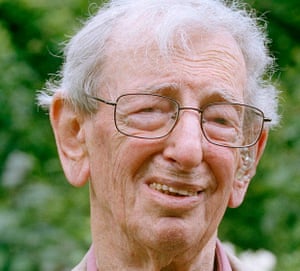
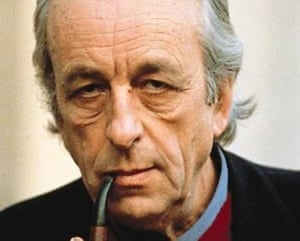
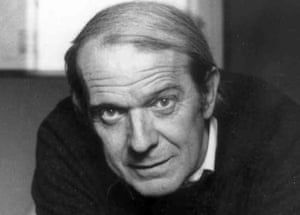

No comments:
Post a Comment